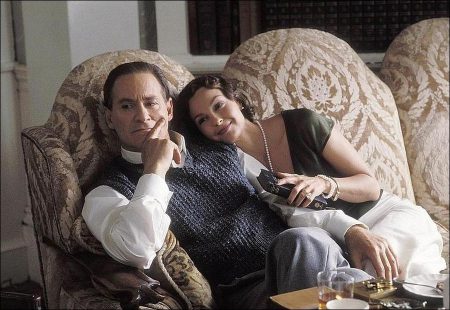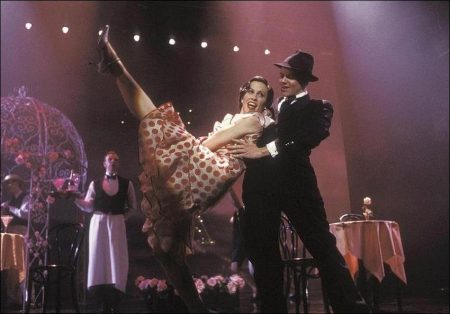Tagline: A love that would never die and music that would live forever.
De-Lovely is an original musical portrait of American composer Cole Porter, filled with his unforgettable songs. In the film, Porter is looking back on his life as if it was one of his spectacular stage shows, with the people and events of his life becoming the actors and action onstage. Through elaborate production numbers and legendary hits like “Anything Goes,” “It’s De-Lovely,” and “Night and Day,” Porter’s elegant, excessive past comes to light – including his deeply complicated relationship with his wife and muse, Linda Lee Porter.
1964. A dying Cole Porter sits alone in his New York apartment, playing the piano and picking out a familiar, melancholy tune. Suddenly a mysterious stranger appears – Gabe – who transports Cole to an empty theater where Gabe is directing what becomes a stage version of Cole’s life story. All the key figures from his past appear onstage to re-enact his life – lovers, colleagues, friends, and, most importantly, his wife, Linda. Scene one begins…
In a Paris salon in the 1920s, Cole meets Linda for the first time. They fall in love immediately, admiring each other’s grace and beauty and enjoying one another’s witty company at the glittering parties of the Jazz Age.
Linda sees genius in Porter’s songs and is willing to maintain that genius at all costs – she loves his talent as much as she loves him. Porter sees in Linda a steadfast companion and indulgent supporter of his work and lifestyle, someone who sees who he really is and still loves him. They get married despite Cole’s warnings that he won’t be able to completely fulfill her. She doesn’t mind – and is fully aware of his affairs with men – but tells him as long as he’s there for her and loves her she can live with that knowledge.
Throughout the marriage, Cole is torn between the very genuine love he feels for Linda and his love of wild parties, drink, and handsome men. As Cole’s fame begins to grow, and with each successive theatrical hit, Linda becomes increasingly concerned that the balance in their lives is tipping in favor of the high life. When she miscarries their long hoped for baby, they decide to move to Hollywood to make a new start. Feted by studio chief L.B. Mayer during MGM’s golden age, Cole writes uninspired but commercially successful film musicals.
Cole’s very public cavorting around town (and a subsequent threat of blackmail) causes Linda to leave Cole and return to Paris. While horseback riding one morning, feeling carefree and over-confident, Cole lets his horse gallop away uncontrollably. The horse falls, throwing Cole, then crashing down on top of him, leading to severe injuries which will affect him the rest of his life. Linda returns from Paris to look after him and is told by the doctor that amputating one or maybe even both legs is the best solution. She tells the doctor with certainty that Cole would rather live in pain and on constant medication than have the shame of losing his legs. With his pride intact, he might be able to overcome the pain and continue working – if he can’t write music, then his life is not worth living.
Cole and Linda move to the peace and quiet of Williamstown where he writes unsatisfying stage musicals. Undeterred by this, nor by the unbearable agony of his condition, Cole sets to work on what will become his greatest hit during his lifetime: “Kiss Me, Kate.” At the musical’s opening night, Cole receives overwhelming applause – but Linda is forced to stay at their home, suffering from a fatal illness and missing her beloved’s greatest triumph.
As Linda utters her final words to Cole, they talk of their love for each other. Despite the many obstacles along the way and Cole’s regret he could never make her happy enough, their love is as pure and tender as when they first met. After Linda’s funeral, Cole sits in the music room of their house with his closest friends, referencing his relationships through his songs. The stage version of Cole’s life which he’s been helping to direct with Gabe merges together with the stories in his head, and once again all the characters from his life are present, singing together onstage.
Suddenly Cole is alone again, an old, disabled man in his dark New York apartment. Still searching for that quintessential love song – one that can finally express how he feels about Linda – Cole sits at the piano and starts to play “In the Still of the Night” softly to himself. A hand reaches out to give him a rose. It’s Linda – young and beautiful once more, as he is, too. They hold each other one last time, reunited as young lovers, as the lights fade slowly to black.
De-Lovely (2004)
Directed by: Irwin Winkler
Starring: Kevin Kline, Ashley Judd, Jonathan Pryce, Angie Hill, Keith Allen, John Barrowman, Natalie Cole, Allan Corduner, Peter Polycarpou, Alanis Morissette, Sheryl Crow
Screenplay by: Jay Cocks
Production Design by: Eve Stewart
Cinematography by: Tony Pierce-Roberts
Film Editing by: Julie Monroe
Costume Design by: Janty Yates
Set Decoration by: John Bush
Art Direction by: John Hill
MPAA Rating: PG-13 for sexual content.
Distributed by: Metro Goldwyn Mayer
Release Date: July 2, 2004
Visits: 63





